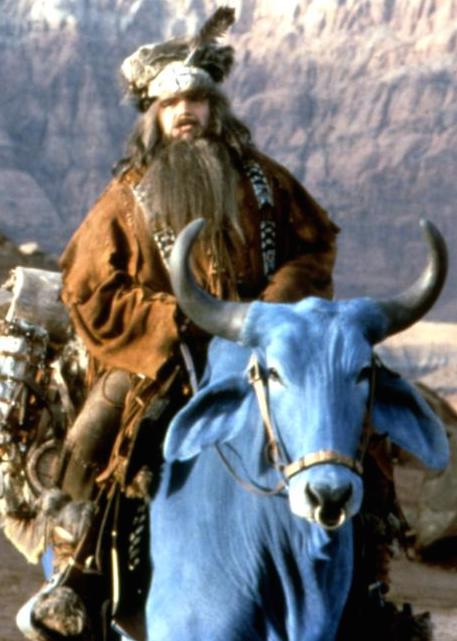Friday, March 24, 1995.
TALL TALE: THE UNBELIEVABLE ADVENTURES OF PECOS BILL. Written by Steven L. Bloom and Robert Rodat. Based on characters created by Edward O’Reilly (Pecos Bill; 1923), W.B. Laughead (Paul Bunyan; 1914) and James Stevens (Paul Bunyan; 1925). Music by Randy Edelman. Directed by Jeremiah Chechik. Running time: 96 minutes. Rated Mature with the B.C. Classifier’s warning: some violence.
NEWT IS GONNA HAVE a cow, man.
A political tactician who appreciates the power of the movies to promote social values, U.S. House Speaker Gingrich is going to see right through left-leaning, liberal-loving director Jeremiah Chechik’s Tall Tale: The Unbelievable Adventures of Pecos Bill.
The folk at Walt Disney Pictures think they’re kidding us with all those ads insisting that it’s just a wacky western fantasy, the story of a turn-of-the-century farmboy who has an Oz-like adventure with legendary frontiersmen Pecos Bill (Patrick Swayze), Paul Bunyan (Oliver Platt) and John Henry (Roger Aaron Brown).
They insist that Chechik, with such feature credits as 1989’s National Lampoon’s Christmas Vacation and the wonderful, whimsical Benny & Joon (1993), is just a fun-loving, Hollywood kind of guy. Newt, with access to the FBI’s dangerous thinker files, knows that Jerry is a Montreal-born Canadian, which means he has to be a socialized-medicine-bred commie, eh!
Superficially, Tall Tale is about 12-year-old Daniel Hackett (Nick Stahl), a kid who longs to see the newly electrified lights of the big city. The time is 1905, and his dedicated farmer father’s oft-told stories are wearing mighty thin.
Chechik gives the game away in his own plot summary: “Although the root conflict is between a boy and his father, it’s also about the industrial age being in conflict with the Old West.”
Notice that the legendary heroes of Chechik’s West are all working men: A cowboy, a black day labourer and an axe-wielding woodsman. Is there a class bias here?
Chechik says “it's about the country’s coming of age and about how the industrial revolution affected a small community.” The villain, murderous J.P. Stiles (Scott Glenn), represents the rapacious, land-grabbing robber barons determined to own everything and everybody.
Now, listen to the “Code of the West,” first enunciated by Daniel’s dad Jonas (Stephen Lang), and repeated by the film's sweaty superheroes:
Respect the land.
Defend the defenceless.
And don’t never spit in front of women nor children.
Sounds pretty folksy until you realize it also is the opposition’s response to today's reactionary Republicans' so-called Contract with America, that gift to our own robber barons, the super-rich demanding tax relief so they can own even more.
Darned if Chechik’s family feature isn’t giving away Newt’s game.
Darned if it isn’t in a direct line of descent from the Disney organization's other recent, eccentric, politically radical kids’ pictures: Newsies (a musical that teaches kids about trade unionism) and Swing Kids (a teen drama exposing the Nazis’ cultural intolerance.)
Like those offbeat, highly personal features, Chechik’s Tall Tale could become the object of cult adoration. Style-conscious throughout, it draws from every corner of cinema's great image bank to sell its point of view.
The reptilian Stiles, for example, lives in a baroque world of evil excess borrowed from Sergio Leone’s spaghetti westerns. John Henry, by contrast, is first seen standing tall against John Ford’s Monument Valley.
Nor are screenwriters Steven Bloom and Robert Rodat above a little revisionism. Their Paul Bunyan is an early-day hippie preaching ecological restraint. “I’m just old-fashioned but in my day we didn’t rob the land, we just borrowed from it."
Truth to tell, Chechik’s picture is a bit of a didactic mess. But I liked it because, hey, it’ll drive Newt nuts.
The above is a restored version of a Province review by Michael Walsh originally published in 1995. For additional information on this archived material, please visit my FAQ.
Afterword: As early as 1964, satirist Tom Lehrer was singing about Hollywood’s tendency “to mix show business with politics.” His song, George Murphy, written for and performed on NBC TV’s topical comedy show That Was the Week That Was, commented on movie-musical star Murphy’s run for a U.S. Senate seat. “Yes,” Lehrer concluded, “now that he’s a Senator, he’s really got the chance / To give the public a song and dance.” Sixteen years later, in 1980, Americans elected General Electric’s corporate spokesmodel, the actor and TV pitchman Ronald Reagan, to be their 40th president. To put it bluntly, the intersection of entertainment and politics in the U.S. is nothing new.
By 1995, newspaper readers were used to seeing politics spilling over on the entertainment pages. The media-savvy Newt Gingrich already had been around for 16 years and, when the above review was written, he was serving as the Speaker of a Republican-controlled House of Representatives. He was dedicated to thwarting the will of Democratic Party President Bill Clinton. I’ve never been a fan of the loathsome Georgia politician, so it came as no surprise when Gingrich’s name was reported to be on candidate Donald Trump’s 2016 short list for a vice-presidential running mate. Though Trump’s choice turned out to be Indiana Governor Mike Pence, Gingrich remains a player, currently lurking about the halls of power as strategic planner for the Republican Party.
Actor Oliver Platt, who turns 57 today, has experienced both politics and public service, but always at one remove. The son of career foreign service officer Nicholas Platt, he was a well-travelled child, growing up in U.S. diplomatic compounds in Asia, Africa and the Middle East. As a performer, he has “served” as a White House Counsel (in eight episodes of The West Wing) and a New York State court judge (starring in the single-season 2003 CBS TV drama Queens Supreme). Stocky, with fleshy features and an intense bearing, Platt has been successful as a supporting player. Although he had a role in 2011’s X-Men: First Class (as the teen mutants’ CIA liaison), to date Paul Bunyan is the closest he’s come to playing an actual superhero.
